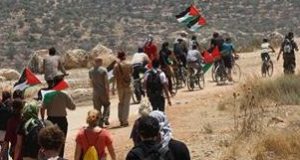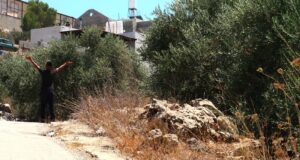Despite the rhetoric of peace, on the ground the lives of Palestinians are being made worse by countless checkpoints
By Ben White
To view original article, published in The Guardian on the 14th May 2008, click here
As Bush arrives in Israel, I remember a moment when the gulf between the language of the official “peace process” and the reality on the ground hit me. It was the summer of 2004, and before leaving my house in the morning, I watched then secretary of state, Colin Powell, make all the familiar noises about Israel, the Palestinians and peacemaking. I then walked to work through the Bethlehem checkpoint while over to my left, Har Homa settlement was growing unchecked.
Fast forward to May 2008. Har Homa is even bigger, and the disparity between the language and approach of the international community’s peace process and the situation in the occupied territories is even starker.
Bush is in Israel this week as part of a wider Middle East tour, and while here, will participate in Shimon Peres’s Facing Tomorrow conference, intended to be part of Israel’s 60th anniversary celebrations.
Superficially at least, there have been striking contradictions in the Bush presidency’s approach to Israel-Palestine. On the one hand, he has been one of the most pro-Israeli presidents in history, and the first to ever publicly endorse illegal settlement blocs. On the other hand, he is also the first US president to call for a Palestinian state.
What seem like irreconcilably different positions become easier to understand if one decodes the language of the peace process in recent years. It has now become par for the course to verbally support the idea of Palestinian statehood, from Ariel Sharon and Ehud Olmert, to Condoleezza Rice and Tony Blair. What it all hinges on, of course, is what that would actually mean.
Furthermore, the Bush administration’s approach to peace, which has been typical of the Quartet in general, has been to view the conflict through an almost exclusively Israeli perspective, while making a nod towards Palestinian humanitarian or economic suffering. A good example is the notorious checkpoints.
Media coverage of the peace process in recent months has been littered with references to the checkpoints, with the likes of Condoleezza Rice making them one of the main issues she has pressed when meeting Israeli officials. Firstly, it is important to note that the fragmentation of the West Bank through checkpoints, closures and the permit system has actually worsened since Annapolis, while Israel plays games with checkpoint removal for PR purposes. Secondly the language used to talk about checkpoints is often supportive of the Israeli security pretence.
It is as if all that is being discussed is an annoyingly time-consuming airport security measure, rather than one component in Israel’s matrix of control in the West Bank and East Jerusalem. It is a system, moreover, specifically designed to colonise land and enforce a separation between Israelis and settlers, and Palestinians. Even Ha’aretz described a UN report in January as noting that:
” … almost all of the obstacles that create the regime of restricted movement are located along the length of a vast road network reserved first and foremost for the Israeli residents. This is a result of the fact that around 40% of the West Bank is covered by settlements, outposts, military infrastructure, nature reserves and closed areas west of the fence.”
The checkpoints, then, are just one way in which the Palestinians are stripped of their individual and collective independence, a humiliation and enforced subordination that affects everything from water access and where you can plant trees, to getting to work and planning a wedding.
Yesterday, I met Jad Isaac, director general of the Applied Research Institute of Jerusalem (ARIJ), an organisation that, among other things, tirelessly documents Israeli colonisation in the occupied territories. He watches as neighbouring settlements grow, and as post-Annapolis, Israel continues to consolidate its grip on its colonies (an assessment corroborated by other organisations, like Peace Now).
One area of the West Bank, vital for any potential Palestinian state, is the Jordan valley. Now, however, the valley is closed to non-resident Palestinians, and local villages face difficulties in marketing agricultural products even to other West Bank cities. These are not, like the separation wall, “temporary security measures”; in April, there was a report that the Israeli foreign minister, Tzipi Livni, presented a map to the Palestinians “in which any future agreement would see Israel retaining control of the larger settlement blocs in the West Bank as well as the Jordan river valley and Jerusalem”.
Perhaps the key to understanding Bush’s approach is contained in a throwaway remark he made to Israeli journalists this week. Speaking of the proposed Palestinian state, Bush noted that such a state “won’t exist until certain obligations are met”. It continues to be the Palestinians who must meet “obligations”; to rein in the militants, to recognise a Jewish state, to soothe and assuage their occupiers’ security needs.
Even if a Palestinian leadership is able to jump through the hoops, what can they expect to gain in return? A rump statelet, the crumbs thrown from the table after Israel has annexed its major colonies and ringed off major Palestinian population centres into ghettoes. Sadly, on what could be Bush’s last visit to Israel-Palestine during his time in office, he is not even visiting Ramallah, let alone the hundreds of Palestinian communities whose very existence is threatened by a colonising occupation that amounts to a lot more than some inconvenient checkpoints.
 International Solidarity Movement Nonviolence. Justice. Freedom.
International Solidarity Movement Nonviolence. Justice. Freedom.



